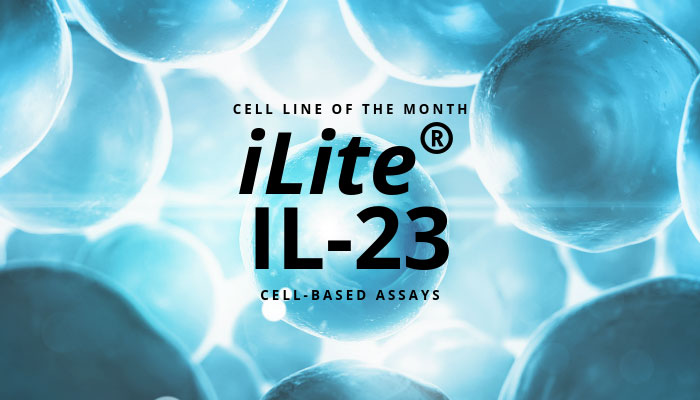- Other Products
- CCP
IL-23 is a pro-inflammatory cytokine that shares traits with IL-12. Both cytokines contain the p40 subunit which binds to the receptor chain IL-12Rβ1. However, the two cytokines exert distinct non-redundant biological functions. Emerging data demonstrate that IL-23 is a key participant in central regulation of the cellular mechanisms involved in inflammation and therapeutic agents targeting both IL-23 and IL-12 cytokines are currently used to treat psoriasis and psoriatic arthritis. In addition, related agents are in clinical testing for a variety of inflammatory disorders.
The iLite® IL-23 Assay Ready Cells is derived from a highly specific reporter gene cell line that can discriminate on a subunit level between the sometime cross reactive IL-23 and IL-12 and subsequently be used for quantifying IL-23 activity, IL-23 inhibitor activity, e.g. Ustekinumab and the activity of neutralizing antibodies against the latter.
iLite® cell lines can be developed for any biopharmaceutical target, and assays for drug potency, i.e. drug activity, and neutralizing antibodies (NAbs) can easily be set-up using the same cell line. The iLite® technology eliminates many of the limitations of conventional cell-based assays as the cells are delivered as assay ready frozen cells, allowing cell-based assays to be carried out without the need for cell culture or the maintenance of cells continuously in the laboratory.
This allows for significant cost reductions and increases the applicability of cell-based assays to routine use as potency or neutralization assays.
For more information about our iLite® Assay Ready Cells - please click here.


IL-23 is a pro-inflammatory cytokine that shares traits with IL-12. Both cytokines contain the p40 subunit which binds to the receptor chain IL-12Rβ1. However, the two cytokines exert distinct non-redundant biological functions. Emerging data demonstrate that IL-23 is a key participant in central regulation of the cellular mechanisms involved in inflammation and therapeutic agents targeting both IL-23 and IL-12 cytokines are currently used to treat psoriasis and psoriatic arthritis. In addition, related agents are in clinical testing for a variety of inflammatory disorders.
The iLite® IL-23 Assay Ready Cells is derived from a highly specific reporter gene cell line that can discriminate on a subunit level between the sometime cross reactive IL-23 and IL-12 and subsequently be used for quantifying IL-23 activity, IL-23 inhibitor activity, e.g. Ustekinumab and the activity of neutralizing antibodies against the latter.
iLite® cell lines can be developed for any biopharmaceutical target, and assays for drug potency, i.e. drug activity, and neutralizing antibodies (NAbs) can easily be set-up using the same cell line. The iLite® technology eliminates many of the limitations of conventional cell-based assays as the cells are delivered as assay ready frozen cells, allowing cell-based assays to be carried out without the need for cell culture or the maintenance of cells continuously in the laboratory.
This allows for significant cost reductions and increases the applicability of cell-based assays to routine use as potency or neutralization assays.
For more information about our iLite® Assay Ready Cells - please click here.